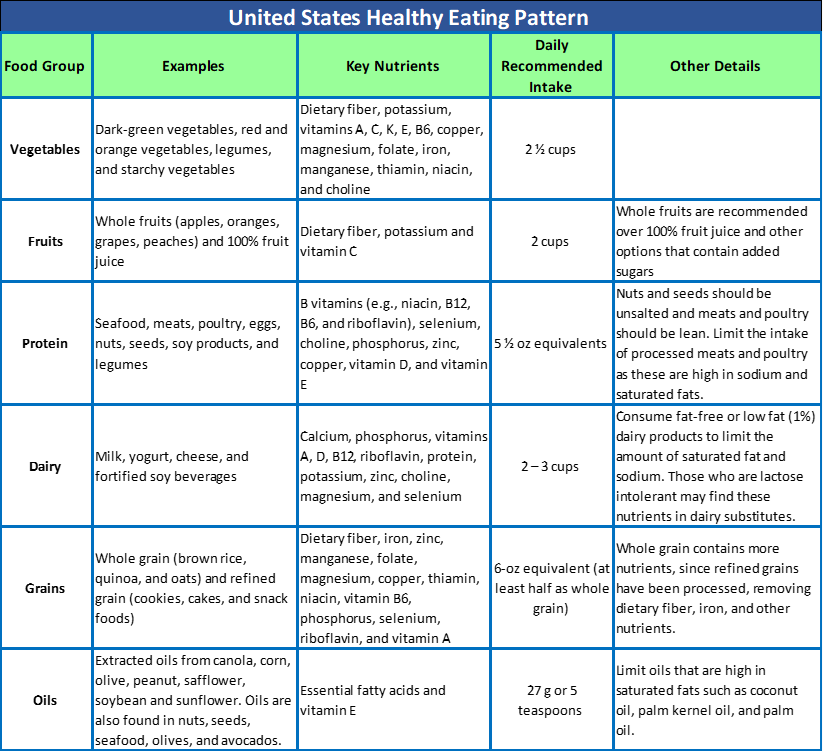The United States Department of Agriculture (USDA) and Department of Health and Human Services (HHS) dietary guidelines1 recommend a diet that consists of nutrient dense foods from various food groups (vegetables, fruits, protein, dairy, grains, oils) within an appropriate calorie level and limiting foods that contain saturated or trans fats, added sugars and sodium. Based on current medical evidence, this healthy eating pattern is designed to help prevent and reduce the risk of chronic diseases such as cardiovascular disease (CVD), type 2 diabetes, obesity, and certain types of cancers, and promotes a healthy body weight. Calorie recommendations vary by age, sex, and physical activity, ranging from an 1800 to 3200 daily calorie intake for adults aged 18 and over.
The table below describes the food groups or components of the Healthy US-Style Eating Pattern and the nutrients and daily recommendations of each group.1

The guidelines also recommend the Healthy Mediterranean-Style Pattern as another option for a healthy diet.1 Compared to the Healthy US-Style eating pattern, the Mediterranean-style contains more fruits and seafood and less dairy. Evaluations comparing both diets showed that the positive health outcomes and nutrient content were similar except for calcium and vitamin D which is slightly lower in the traditional Mediterranean diet.
The Mediterranean diet has been extensively studied for its health benefits, including for CVD risk reduction, type-2 diabetes, weight loss, CVD risk factors, age-related cognitive decline, and overall morbidity and mortality.2-35 In randomized controlled trials, significant benefits in the primary and secondary prevention of cardiovascular disease was demonstrated in those on the Mediterranean diet. For example, the PREDIMED (PREvención con DIeta MEDiterránea) trial randomized 7447 men and women adults in Spain for eight years to three diets: MeDiet + extra-virgin olive oil (EVOO), MeDiet + nuts, and control diet (advice on low-fat diet).2 The hazard ratio (HR) for CVD events (myocardial infarction, stroke or CVD death) was 0.70 (95% confidence interval [CI] [0.53 – 0.91]) in the MeDiet + EVOO group and 0.70 (95% CI [0.53 – 0.94] in the MeDiet + nuts compared to the control group. Incident diabetes was also lower for MeDiet + EVOO (HR 0.60, 95% CI [0.43 – 0.85]) compared to the control group.
The USDA and HHS guidelines have also developed the Healthy Vegetarian Eating Pattern for those who have self-identified as vegetarians.1 In comparison to the Healthy US-Style Eating Pattern, the Vegetarian diet contains more legumes (beans and peas), soy products, nuts and seeds, and whole grains to supplement the nutrients lacking from the absence of meats, poultry, and seafood. As a result of these substitutions, the typical Vegetarian diet delivers somewhat higher calcium and dietary fiber, but lower vitamin D. But all diets mentioned here meet the requirements of a healthy eating pattern.
References
- 2015 – 2020 dietary guidelines for Americans. 8 ed: U.S. Department of Health and Human Services and U.S. Department of Agriculture; 2015.
- Martínez-González MA, Salas-Salvadó J, Estruch R, et al. Benefits of the Mediterranean Diet: Insights From the PREDIMED Study. Prog Cardiovasc Dis 2015; 58 (1): 50-60.
- Valls-Pedret C, Sala-Vila A, Serra-Mir M, et al. Mediterranean Diet and Age-Related Cognitive Decline: A Randomized Clinical Trial. JAMA Intern Med 2015; 175 (7): 1094-1103.
- Widmer RJ, Flammer AJ, Lerman LO, et al. The Mediterranean diet, its components, and cardiovascular disease. Am J Med 2015; 128 (3): 229-238.
- de Lorgeril M, Salen P, Martin JL, et al. Mediterranean diet, traditional risk factors, and the rate of cardiovascular complications after myocardial infarction: final report of the Lyon Diet Heart Study. Circulation 1999; 99 (6): 779-785.
- Fung TT, Rexrode KM, Mantzoros CS, et al. Mediterranean diet and incidence of and mortality from coronary heart disease and stroke in women. Circulation 2009; 119 (8): 1093-1100.
- Keys A, Menotti A, Karvonen MJ, et al. The diet and 15-year death rate in the seven countries study. Am J Epidemiol 1986; 124 (6): 903-915.
- Nordmann AJ, Suter-Zimmermann K, Bucher HC, et al. Meta-analysis comparing Mediterranean to low-fat diets for modification of cardiovascular risk factors. Am J Med 2011; 124 (9): 841-851.e842.
- Kastorini CM, Milionis HJ, Esposito K, et al. The effect of Mediterranean diet on metabolic syndrome and its components: a meta-analysis of 50 studies and 534,906 individuals. J Am Coll Cardiol 2011; 57 (11): 1299-1313.
- Maderuelo-Fernandez JA, Recio-Rodriguez JI, Patino-Alonso MC, et al. Effectiveness of interventions applicable to primary health care settings to promote Mediterranean diet or healthy eating adherence in adults: A systematic review. Prev Med 2015; 76 Suppl: S39-55.
- Trichopoulou A, Martinez-Gonzalez MA, Tong TY, et al. Definitions and potential health benefits of the Mediterranean diet: views from experts around the world. BMC Med 2014; 12: 112.
- Trichopoulou A, Vasilopoulou E. Mediterranean diet and longevity. Br J Nutr 2000; 84 Suppl 2: S205-209.
- Serra-Majem L, Roman B, Estruch R. Scientific evidence of interventions using the Mediterranean diet: a systematic review. Nutr Rev 2006; 64 (2 Pt 2): S27-47.
- Roman B, Carta L, Martinez-Gonzalez MA, et al. Effectiveness of the Mediterranean diet in the elderly. Clin Interv Aging 2008; 3 (1): 97-109.
- Buckland G, Bach A, Serra-Majem L. Obesity and the Mediterranean diet: a systematic review of observational and intervention studies. Obes Rev 2008; 9 (6): 582-593.
- Sofi F, Cesari F, Abbate R, et al. Adherence to Mediterranean diet and health status: meta-analysis. BMJ 2008; 337: a1344.
- Sofi F, Macchi C, Abbate R, et al. Mediterranean diet and health status: an updated meta-analysis and a proposal for a literature-based adherence score. Public Health Nutr 2014; 17 (12): 2769-2782.
- de Lorgeril M, Salen P. The Mediterranean diet: rationale and evidence for its benefit. Curr Atheroscler Rep 2008; 10 (6): 518-522.
- Martinez-Gonzalez MA, Bes-Rastrollo M, Serra-Majem L, et al. Mediterranean food pattern and the primary prevention of chronic disease: recent developments. Nutr Rev 2009; 67 Suppl 1: S111-116.
- Tyrovolas S, Panagiotakos DB. The role of Mediterranean type of diet on the development of cancer and cardiovascular disease, in the elderly: a systematic review. Maturitas 2010; 65 (2): 122-130.
- Esposito K, Maiorino MI, Ceriello A, et al. Prevention and control of type 2 diabetes by Mediterranean diet: a systematic review. Diabetes Res Clin Pract 2010; 89 (2): 97-102.
- Sofi F, Abbate R, Gensini GF, et al. Accruing evidence on benefits of adherence to the Mediterranean diet on health: an updated systematic review and meta-analysis. Am J Clin Nutr 2010; 92 (5): 1189-1196.
- Esposito K, Kastorini CM, Panagiotakos DB, et al. Mediterranean diet and weight loss: meta-analysis of randomized controlled trials. Metab Syndr Relat Disord 2011; 9 (1): 1-12.
- Esposito K, Kastorini CM, Panagiotakos DB, et al. Mediterranean diet and metabolic syndrome: an updated systematic review. Rev Endocr Metab Disord 2013; 14 (3): 255-263.
- Esposito K, Giugliano D. Mediterranean diet and type 2 diabetes. Diabetes Metab Res Rev 2014; 30 Suppl 1: 34-40.
- Rees K, Takeda A, Martin N, et al. Mediterranean-style diet for the primary and secondary prevention of cardiovascular disease. Cochrane Database Syst Rev 2019; 3: Cd009825.
- Bullo M, Lamuela-Raventos R, Salas-Salvado J. Mediterranean diet and oxidation: nuts and olive oil as important sources of fat and antioxidants. Curr Top Med Chem 2011; 11 (14): 1797-1810.
- Koloverou E, Esposito K, Giugliano D, et al. The effect of Mediterranean diet on the development of type 2 diabetes mellitus: a meta-analysis of 10 prospective studies and 136,846 participants. Metabolism 2014; 63 (7): 903-911.
- Psaltopoulou T, Sergentanis TN, Panagiotakos DB, et al. Mediterranean diet, stroke, cognitive impairment, and depression: A meta-analysis. Ann Neurol 2013; 74 (4): 580-591.
- Grosso G, Mistretta A, Frigiola A, et al. Mediterranean diet and cardiovascular risk factors: a systematic review. Crit Rev Food Sci Nutr 2014; 54 (5): 593-610.
- Martinez-Gonzalez MA, Bes-Rastrollo M. Dietary patterns, Mediterranean diet, and cardiovascular disease. Curr Opin Lipidol 2014; 25 (1): 20-26.
- Ros E, Martinez-Gonzalez MA, Estruch R, et al. Mediterranean diet and cardiovascular health: Teachings of the PREDIMED study. Adv Nutr 2014; 5 (3): 330S-336S.
- Georgoulis M, Kontogianni MD, Yiannakouris N. Mediterranean diet and diabetes: prevention and treatment. Nutrients 2014; 6 (4): 1406-1423.
- Whayne TF, Jr. Ischemic heart disease and the Mediterranean diet. Curr Cardiol Rep 2014; 16 (6): 491.
- Schwingshackl L, Hoffmann G. Mediterranean dietary pattern, inflammation and endothelial function: a systematic review and meta-analysis of intervention trials. Nutr Metab Cardiovasc Dis 2014; 24 (9): 929-939.



.png)
